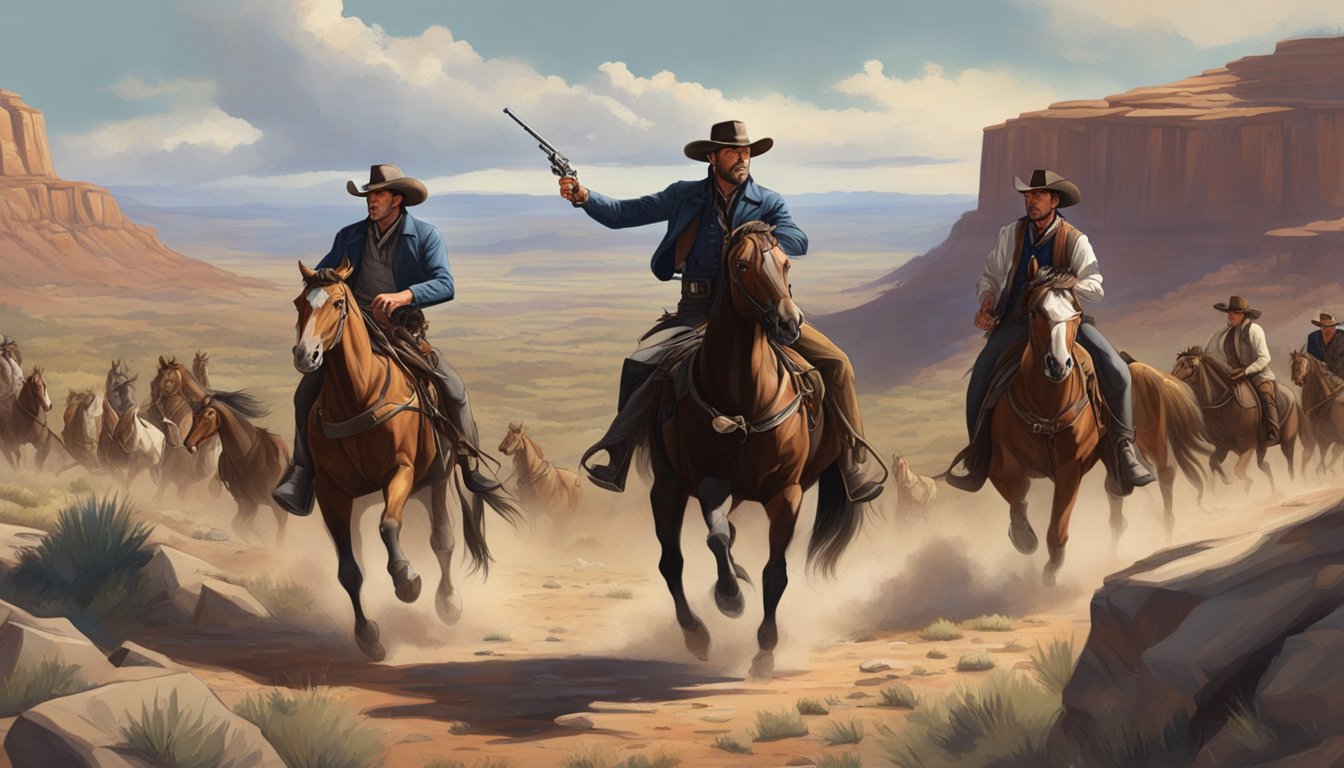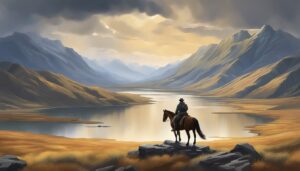Western heroes have captivated audiences for generations, with their rugged charm and steadfast principles. Two iconic figures that stand out are Yellowstone’s John Dutton and The Big Valley’s Clay Spencer. Both characters embody the quintessential Western archetype, but each brings unique qualities to the screen.
John Dutton, portrayed by Kevin Costner, is the patriarch of the Dutton family and owner of the largest contiguous ranch in the United States. His unwavering determination to protect his land and legacy has made him a formidable force in the modern Western landscape. Clay Spencer, played by Lee Majors in The Big Valley, represents an earlier era of Western heroes. As the youngest son of the Barkley family, he combines youthful vigor with a strong sense of justice.
While both characters are impressive in their own right, John Dutton’s complex moral code and ability to navigate the challenges of the contemporary West give him a slight edge in terms of overall impact and depth. Dutton’s struggles with changing times, political pressures, and family dynamics resonate with modern audiences, making him a more relatable and nuanced character. Clay Spencer, though equally charismatic, represents a more traditional Western hero, rooted in the ideals of a bygone era.
Historical Context And The Dutton Legacy

The Dutton family saga spans generations, tracing back to the post-Civil War era of 1883. James and Margaret Dutton embarked on a westward journey, laying the foundation for what would become the iconic Dutton Ranch.
Their children – Elsa, John, and Spencer – faced the challenges of settling in a new frontier. John Dutton Sr., son of James and Margaret, continued the family’s legacy into the early 20th century.
The 1920s brought new trials for the Duttons. Jacob Dutton, along with his wife Cara, led the family through the tumultuous times of Prohibition and the Great Depression. Their resilience in the face of adversity solidified the Dutton name.
John Dutton II further expanded the family’s influence, paving the way for John Dutton III – the central figure in the modern “Yellowstone” series. His children, including Lee Dutton and Tate Dutton, represent the latest branches of this extensive family tree.
The Dutton legacy is marked by a fierce determination to protect their land and way of life. From James Dutton’s initial claim to John Dutton III’s present-day struggles, each generation has fought to preserve their inheritance.
This family saga reflects broader themes of the American West – the challenges of settlement, the impact of historical events, and the enduring spirit of those who shaped the frontier.
Character Analysis: John Dutton

John Dutton, portrayed by Kevin Costner, stands as the complex patriarch at the heart of Yellowstone. His character embodies the struggle between tradition and modernity in the American West.
A Character Study of John Dutton
John Dutton is a man of unwavering determination and fierce loyalty to his land and legacy. His rugged exterior masks deep-seated emotions and internal conflicts.
Dutton’s moral compass often wavers between righteous protection of his family’s heritage and ruthless tactics to maintain control. This duality creates a compelling anti-hero figure.
His character arc explores themes of power, sacrifice, and the cost of preserving a way of life in a changing world.
John Dutton’s Role As The Patriarch
As the Dutton family patriarch, John shoulders immense responsibility. He leads with authority, making tough decisions to protect the ranch and his family’s interests.
His leadership style blends traditional values with pragmatic adaptability. John often finds himself caught between upholding family traditions and navigating modern challenges.
This role strains his relationships, as he must balance being a father with being a business leader and landowner.
John Dutton’s Relationships With Family Members
John’s interactions with his children reveal complex family dynamics. His relationship with Beth, his daughter, is marked by mutual understanding and fierce loyalty.
With Jamie, tensions arise from conflicting values and ambitions. John’s bond with Kayce is tested by Kayce’s divided loyalties between the ranch and his own family.
John’s role as grandfather to Tate, Kayce and Monica’s son, adds depth to his character, showing a softer side beneath his tough exterior.
These family relationships highlight John’s strengths and flaws as a father and leader.
Character Analysis: Clay Spencer

Clay Spencer stands out as a compelling Western hero in “The Big Valley” television series. His complex character, heroic actions, and impact on those around him make him a memorable figure in the genre.
A Character Study of Clay Spencer
Clay Spencer is portrayed as a rugged and principled man with a mysterious past. He possesses a strong moral compass and unwavering loyalty to those he cares about. Spencer’s character is defined by his quiet strength, resourcefulness, and ability to handle difficult situations with grace.
His backstory reveals a man who has faced personal struggles and loss, shaping him into a resilient and compassionate individual. Spencer’s interactions with other characters often showcase his wisdom and patience.
Despite his tough exterior, he demonstrates a softer side in his relationships, particularly with the Barkley family.
Clay Spencer’s Role As A Western Hero
As a Western hero, Clay Spencer embodies the classic traits of bravery, integrity, and justice. He frequently puts himself in harm’s way to protect others and uphold what he believes is right.
Spencer’s skills as a horseman, marksman, and strategist make him a formidable ally in dangerous situations. His quick thinking and cool demeanor under pressure are hallmarks of his heroic persona.
Unlike some Western heroes, Spencer is not prone to unnecessary violence. He often seeks peaceful resolutions to conflicts, using force only as a last resort. This nuanced approach to heroism adds depth to his character and sets him apart from more one-dimensional Western protagonists.
Clay Spencer’s Impact on His Family and Community
Clay Spencer’s presence has a profound effect on both his family and the wider community. Within the Barkley family, he serves as a stabilizing force and trusted advisor. His wisdom and experience often guide the younger family members through difficult decisions.
In the community, Spencer is respected for his fairness and willingness to stand up for those in need. His actions inspire others to be more courageous and compassionate.
Spencer’s impact extends beyond immediate conflicts. He helps shape the moral fabric of the community by setting an example of integrity and selflessness. His legacy is one of positive change and enduring influence on those around him.
The Dutton Family: Power And Land

The Dutton family’s influence in Montana centers on their vast Yellowstone Ranch and political connections. Their ongoing battle to maintain control of their ancestral lands intersects with their roles as livestock commissioners.
The Struggle for Control of Yellowstone Ranch
The Dutton Ranch, spanning thousands of acres in Montana, faces constant threats from developers and other outside forces. John Dutton leads the family’s efforts to protect their legacy.
The ranch represents generations of Dutton history and serves as the family’s power base. Its vast size and resources make it a prime target for those seeking to exploit Montana’s land.
Developers, corporations, and neighboring Native American tribes all covet portions of the Dutton property. This leads to frequent conflicts and legal battles over land rights and usage.
The Duttons employ various tactics to maintain control, including leveraging political connections and occasionally resorting to more aggressive measures. Their determination to keep the ranch intact drives much of the family’s actions and decision-making.
The Duttons as Livestock Commissioners
Beyond the ranch, the Dutton family extends their influence through positions as Montana Livestock Commissioners. This role grants them significant authority in the state’s agricultural sector.
As commissioners, the Duttons have the power to enforce livestock-related laws and regulations. They oversee issues like cattle branding, animal health, and grazing rights.
This official capacity allows them to shape policies that benefit their own interests and those of other ranchers. It also puts them in frequent contact with state officials and other influential figures.
The position of Livestock Commissioner adds another layer to the Duttons’ complex web of power and relationships in Montana. It reinforces their status as key players in the state’s ranching community.
The Duttons Through The Eras
The Dutton family’s journey spans over a century, from pioneers to present-day ranchers. Their story weaves through historical events and generational changes, shaping their legacy in Paradise Valley.
Dutton Family in the Historical Context
James and Margaret Dutton founded the Yellowstone Ranch in 1883. They embarked on a perilous wagon train journey from Texas to Montana with their children, Elsa and John. Elsa’s tragic death from an arrow wound influenced the ranch’s location. John Dutton Sr. grew up to run the ranch alongside his uncle Jacob Dutton in the 1920s. This era saw the family facing challenges like drought and economic hardship.
The ranch passed down through generations, adapting to changing times. By the 1960s, John Dutton III took the reins, steering the family business through modernization and environmental shifts.
Generational Shifts in the Dutton Family
Each generation of Duttons faced unique challenges. James and Margaret were frontier settlers, establishing the ranch’s foundations. John Dutton Sr. navigated the ranch through early 20th-century changes. John III expanded the ranch’s influence in Montana’s Paradise Valley.
The current generation, led by John Dutton III, grapples with modern threats to their land. His children – Lee, Jamie, Beth, and Kayce – play crucial roles in preserving the family legacy. Their conflicts and alliances form the core of the “Yellowstone” series.
The Dutton family tree branches out through various spinoff series. “1883” explores the family’s origins, while “1923” focuses on the Prohibition era. These shows provide deeper insights into the Dutton lineage and its evolution.
Cinematic Representation

“Yellowstone” and “The Big Valley” showcase different eras of Western television, each employing unique storytelling techniques and featuring powerful performances. The shows’ cinematic approaches highlight the evolving landscape of Western drama.
Storytelling Techniques in Yellowstone & The Big Valley
“Yellowstone” utilizes modern storytelling methods, blending family drama with high-stakes conflicts. Created by Taylor Sheridan, the show employs complex character arcs and intricate plotlines. It explores contemporary issues facing ranchers and Native Americans in Montana.
“The Big Valley” follows a more traditional Western format. The series focuses on the Barkley family’s adventures, often resolving conflicts within single episodes. It emphasizes moral lessons and family values typical of its 1960s era.
Both shows use sweeping landscape shots to capture the grandeur of the American West. “Yellowstone” incorporates more mature themes and graphic content, reflecting current television trends.
Performances: Kevin Costner vs The Big Valley Cast
Kevin Costner‘s portrayal of John Dutton in “Yellowstone” brings gravitas to the role of a modern ranching patriarch. His nuanced performance captures Dutton’s strength, vulnerability, and moral ambiguity. Costner’s star power adds significant weight to the Paramount Network series.
“The Big Valley” boasted a talented ensemble cast led by Barbara Stanwyck as Victoria Barkley. The actors delivered memorable performances that defined their characters for generations of viewers. Their portrayals embodied the idealized Western heroes of the mid-20th century.
Recent “Yellowstone” spinoffs like “1923” feature Hollywood legends Harrison Ford and Helen Mirren, further elevating the franchise’s acting pedigree. These additions demonstrate the continuing appeal of Western dramas to top-tier talent.
Conclusion

John Dutton and Clay Spencer stand as iconic Western heroes, each leaving an indelible mark on television. Dutton’s modern rancher persona contrasts with Spencer’s classic 19th-century character, offering unique perspectives on the American West.
Both characters demonstrate unwavering loyalty to family and land. Their leadership skills and moral compasses, though sometimes questionable, drive compelling narratives in their respective series.
Dutton’s contemporary challenges resonate with today’s audiences, while Spencer’s historical setting provides nostalgia and timeless themes. The actors’ performances breathe life into these complex characters, making them relatable and memorable.
Ultimately, determining which hero is more impressive comes down to personal preference. Some may favor Dutton’s gritty realism, while others appreciate Spencer’s traditional Western values.
Both characters contribute significantly to the Western genre, showcasing its enduring appeal across different eras of television. Their legacies continue to inspire new generations of Western enthusiasts and storytellers.



